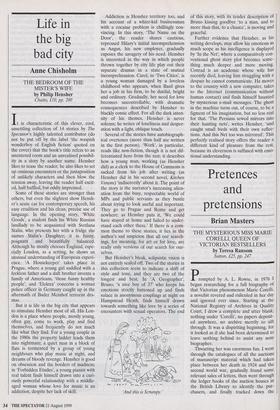Life in the big bad city
Anne Chisholm
THE BEDROOM OF THE MISTER'S WIFE by Philip Hensher Chatto, £10, pp. 200 It is characteristic of this clever, cool, unsettling collection of 14 stories by The Spectator's highly talented contributor (do not be put off by the label 'the waspish wonderboy of English fiction' quoted on the cover) that the book's title refers to an unentered room and an unrealised possibil- ity in a story by another name. Hensher likes to tease the reader; he also likes to set up ominous encounters or the juxtaposition of unlikely characters and then blow the tension away, leaving the reader half excit- ed, half baffled, but oddly impressed.
Some of these stories are stronger than others, but even the slightest show Hensh- er's acute ear for contemporary speech, his easy erudition and his clean, precise use of language. In the opening story, 'White Goods', a student finds his White Russian landlady to be acquainted with Svetlana Stalin, who presents her with a fridge she names Stalin's Daughter; it is funny, poignant and beautifully balanced. Although he mostly chooses England, espe- cially London, as a setting, he shows an unusual understanding of European experi- ence. 'A Housekeeper' takes place in Prague, where a young girl saddled with a feckless father and a daft brother invents a family of Americans, 'those funny healthy people', and 'Elektra' concerns a woman police officer in Germany caught up in the aftermath of Bader Meinhof terrorist dra- mas.
But it is life in the big city that appears to stimulate Hensher most of all. His Lon- don is a place where people, mostly young, often gay, come to work, play and find themselves, and frequently do not much like what they find. For a young couple in the 1980s the property ladder leads them into nightmare; a quiet man in a block of flats is tormented by a group of young neighbours who play music at night, and dreams of bloody revenge. Hensher is good on obsession and the borders of madness; in 'Forbidden Etudes', a young pianist with real talent finds himself drawn into a curi- ously powerful relationship with a middle- aged woman whose love for music is an addiction, despite her lack of skill. Addiction is Hensher territory too, and his account of a whizz-kid businessman with a cocaine problem is chillingly con- vincing. In this story, 'The Name on the Door', the reader shares cautious, repressed Hilary's initial incomprehension as Angus, his new employer, gradually exposes the savagery of his need. Hensher is interested in the way in which people thrown together by city life play out their separate dramas in a state of mutual incomprehension. Carol, in 'Two Cities', is a young woman damaged by a loveless childhood who appears, when Basil gives her a job in his firm, to be dutiful, bright and ordinary. Gradually, her need for love becomes uncontrollable, with dramatic consequences described by Hensher to blackly comic effect. For all the dark inten- sity of his themes, Hensher is never solemn; he writes of loneliness and desper- ation with a light, oblique touch.
Several of the stories have autobiograph- ical overtones (more than half are written in the first person). 'Work', in particular, reads like non-fiction, though it is not dif- ferentiated here from the rest; it describes how a young man, working (as Hensher did) as a clerk to the House of Commons is sacked from his job after writing (as Hensher did in his second novel, Kitchen Venom) 'indiscreetly' about it. The point of the story is the narrator's increasing alien- ation from the busy, respectable world of MPs and public servants as they bustle about trying to look useful and important. They go to Prague and Rome and get nowhere; as Hensher puts it, 'We could have stayed at home and failed to under- stand each other there.' If there is a com- mon theme to these stories, it lies in the author's sad suspicion that all our search- ings, for meaning, for art or for love, are really only versions of our search for our- selves.
But Hensher's bleak, solipsistic vision is not entirely sealed off. Two of the stories in this collection seem to indicate a shift of style and tone, and they are two of the longest and best. In 'A Geographer', Bruno, 'a nice boy of 37' who keeps his emotions strictly buttoned up and finds solace in anonymous couplings at night on Hampstead Heath, finds himself drawn towards something like love by a series of encounters with sexual operators. The end And this is Scrumpy.' of this story, with its tender description of Bruno kissing goodbye `to a man, and to more than that, to a chance', is moving and graceful.
Further evidence that Hensher, as his writing develops, may allow his emotions as much scope as his intelligence is displayed by 'In the Net', where a comparatively con- ventional ghost story plot becomes some- thing much deeper and more moving. Conrad is an academic whose wife has recently died, leaving him struggling with a despair he cannot communicate. He moves to the country with a new computer, takes to the Internet (communication without human contact) and finds himself haunted by mysterious e-mail messages. The ghost in the machine turns out, of course, to be a figment of his imagination, but no less real for that. 'The Persians sewed mirrors into their hunting nets', writes Hensher, 'and caught small birds with their own reflec- tions. And this Net too was mirrored'. This perfectly realised story offers the reader a different kind of pleasure from the rest, because its cleverness is suffused with emo- tional understanding.


























































 Previous page
Previous page